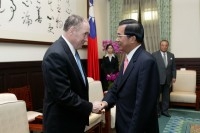News & activities
 News releases
News releases

President Chen welcomed Dr. Edward Prescott, the recipient of the 2004 Nobel Economic Prize, this morning. The president greeted and expressed his gratitude to the visitor for accepting an invitation to give a speech in Taiwan.
Moved by Dr. Prescott's actions, the president said that this was the first time a Nobel Prize awardee has honored Taiwan by visiting so soon after receiving the world's highest economic honors.
During their meeting, Dr. Prescott spoke of his August 5th speech in Singapore where he expressed his views on the slowing pace of China's economic growth and the other significant factors influencing it. The president seized the opportunity to listen to his guest's expert opinions, as well as, exchange views with him unrelated to the economy.
Dr. Prescott reasoned that China's rapid economic growth stemmed from the transfer of low-productivity and traditional industries into more modern and urbanized ones. He argued, however, that such transfers are not sustainable and that the statistics behind China's modern-like industries are not optimistic. Dr. Prescott believes that China's productivity is far lower than that of wealthy industrialized countries such as the United States, Western Europe, Taiwan, Singapore, Japan and South Korea. When these resources cease to be transferable, China's economical growth, he contends, will also cease.
Following Dr. Prescott's remarks, the president invited his guest to give his thoughts on Taiwan's economic future. The president asked the economic expert about the possible dangers of Taiwan being too economically dependant on China, when 26 percent of the island's exports, as well as, 67 percent of its foreign investments are going to China.
Dr. Prescott replied that because he did not have a deep understanding of the Chinese government, it would be hard for him to predict China's future policy towards Taiwan. He believes, however, that Taiwanese investors should carefully examine the economic relationships between Taiwan and China. Dr. Prescott stated that, from his understanding, several high value-added and high technology industries have moved there manufacturing operations to China to take advantage of the inexpensive labor. These products will then be sold to the global market, a large portion of them in the United States. This mitigates risk through diversification. He stated that while China's economy is still stable, there are still potential causes for instability. Thus, the best strategy is to diversify the investment to several countries and in different forms.
The president emphasized Taiwan's necessity in calculating the risk a tumultuous political relationship with China will have on Cross-Strait economic ties. He stated that Taiwan interacts with China differently than most other countries in terms of international trade, trade cooperation and business exchanges due to China's insistency on treating Taiwan as a local territory. And with the Chinese government passing the "Anti-Separation Law" this past March, legislation aimed at resolving the Taiwan Strait's issue through non-peaceful means, annexation and unification have now become Taiwan's greatest political threat. Taiwan must carefully evaluate its economic exchanges and investments with a China that is likely to use violence against it, stated the president. Unlike the United States or even Japan, China is a country that is hostile towards Taiwan, an element of Taiwan's reality that affects every decision made.
The president regarded minimizing economic risks with China as complicated. He stated that Taiwan's policy is to normalize economic and trade relations with China, meaning politics would be politics and economics would be economics, but it is not that simple. The president illustrated his point with the example of the direct charter flights between Taiwan and China. The primary economic need for Taiwan, stated the president, is for a more convenient freight transport; however, the Chinese are politicizing the issue by pushing to launch direct commercial flights first. China wishes to employ a united front strategy in which having access to direct passenger flights would provide China with a means to spread propaganda in Taiwan. Therefore, with concerns for national security, the president does not want direct commercial flights before direct freight flights. China's political undertones are unfortunate because it disrupts what should be economic negotiations between two countries, said the president.
The president further highlighted the complexity of Taiwan's situation noting that while Taiwanese capital, labor and technology flow into China, there are 706 ballistic missiles strategically deployed along China's southeastern coast aimed at Taiwan. Referring to the Cuban Missile crisis as an example, the president said that for 13 days relations between the United States and Cuba were antagonistic because of two missiles; however, Taiwan's dilemma is that there are more than two missiles threatening it.
Finally, the president explained the reasons for the delay for China to opening direct-chartered freight flights between Taiwan and China. One reason is that there is no strategic advantage for China to use direct-chartered freight flight as a tool to pressure Taiwan for unification. Another reason is that Taiwan holds a competitive advantage in freight transport and therefore will benefit more from the direct flight. Both sides, however, can benefit from such a direct flight if the two parties are willing to negotiate and share the benefits. Thus, this should not be the reason for China's reluctance in opening direct-chartered freight flights said the president.


